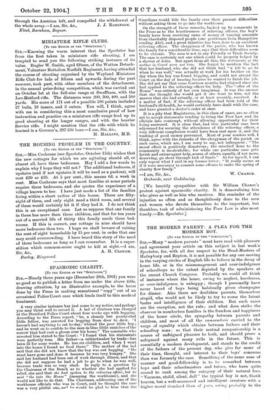A very similar instance has just come to my notice,
and perhaps you may think well to record it. A lad of thirteen was charged at the Stratford Police Court about four weeks ago with begging. According to the Press report, "he, a cleanly but poorly-clad little fellow, was arrested for begging from door to door. haven't had anything to eat to-day,' whined the poor little boy ; and he went on to confide to the man in blue little snatches of the sorrow that had cast a gloom over his home." The constable who arrested him stated to the Court : "I found that his statembnts were perfectly true. His father—a cabinetmaker by trade—has been ill for some weeks. He has six children, and when I went into the house I found no food there." The mother of the lad said that she did not know that the boy was out begging. "He must have gone and done it because he was very hungry." She said her husband had been out of work through illness, and that she did not suppose he had a job to go to when he was well, because trade was so very slack. In reply to a question by the Chairman of the Bench as to whether she had applied for relief, she said that she had spoken to the relieving officer, but he said "Go into the House" (meaning the workhouse), and she would not like to do that. The Chairman, addressing one of the workhouse officials who was in Court, said he thought the case was a very pitiful one, and be would be glad to hear that the On the strength of these remarks, backed up by comments in the Press as to the heartlessness of relieving officers, the boy's family have been receiving sums of money of varying amounts from charitably disposed people (one gentleman from Hampshire sending £10), and a great injustice has been done to an excellent relieving officer. The clergyman of the parish, who has known the family for a considerable time, says that their difficulties seem to be chronic. The man is not in any Friendly or Trade Society. The case is certainly not one which could be properly helped by a shower of doles. But apart from all this, the statements of the mother in Court were not true. She forgot to mention the fact that her husband, who she did not think had "a job to go to when he was well," was actually at work for his brother on the day when the boy was found begging, and could not attend the Court on the day of hearing because he wanted to finish the job. She did not say that some fourteen months had elapsed since she had applied to the relieving officer for help. The " offer of the House" was entirely of her own imagining. It was the answer that she thought she would get if she went to him, not the answer that she had actually, or at least recently, received. As a matter of fact, if the relieving officer had been told of tho husband's ill-health, he would certainly have dealt with the case, and have granted a doctor's order at once.
It is a pity that Magistrates, in this class of cases, are so often apt to accept statements tending to bring the Poor Law and its officials into contempt, without allowing opportunity for their being answered. It is clear that, had this particular case been adjourned for securing the attendance of the relieving officer, a very different complexion would have been cast upon it, and the wasting of good money prevented. Most of your readers will, I think, agree with the remarks of the clergyman of the parish on such cases, which are, I am sorry to say, not infrequent : " The moral effect is positively disastrous ; the mischief done to the community is incalculable; for while one particular case gets lavish and extravagant help, scores of others, equally, if not more, deserving, go short through lack of funds." As for myself, I can only repeat what I said in my former letter: " It really seems as if it were necessary to commit some offence to make the spring of charity flow freely."
—I am, Sir, &c., W. CHANCE.
Orchards, near Godalnting.
[We heartily sympathise with Sir William Chance's protest against spasmodic charity. It is demoralising bins who gives as well as him who receives. His reminder of the injustice so often and so thoughtlessly done to the men and women who devote themselves to the important, but thankless, task of administering the Poor Law is also most timely.—En. Spectator.]










































 Previous page
Previous page